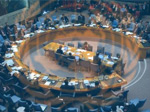Sahara Conflict …. And the process of negotiations will continue
 The direct talks, the first in at least seven years between Morocco and the Polisario, hosted by Peter Van Walsum, UN chief Ban Ki-moon's envoy for Western Sahara ended on June 18 in Manhasset. The sides have met at least four times before, most recently in 2000 in Berlin, but United Nations representatives have billed this week's talks as the best chance so far to end the three-decade long Sahara dispute. Both parties agreed to meet again in August after first round of talks fails to break impasse.
The direct talks, the first in at least seven years between Morocco and the Polisario, hosted by Peter Van Walsum, UN chief Ban Ki-moon's envoy for Western Sahara ended on June 18 in Manhasset. The sides have met at least four times before, most recently in 2000 in Berlin, but United Nations representatives have billed this week's talks as the best chance so far to end the three-decade long Sahara dispute. Both parties agreed to meet again in August after first round of talks fails to break impasse.The dynamics of the conflict have not changed, and the positions of Rabat and the Algeria-backed Polisario are far apart.
For Morocco, the political, negotiated and mutually acceptable solution reside in the autonomy proposal for the Southern Provinces. The autonomy referendum envisages giving Sahraoui control over their affairs through legislative, executive and judicial institutions under Moroccan sovereignty.
For Morocco, the political, negotiated and mutually acceptable solution reside in the autonomy proposal for the Southern Provinces. The autonomy referendum envisages giving Sahraoui control over their affairs through legislative, executive and judicial institutions under Moroccan sovereignty.
The Polisario meanwhile rejects the Moroccan referendum proposal and instead demanded respect of the "the right of the (local) people for self-determination".
The Security Council has asked the two parties to make an effort to break the impasse since the failure of previous UN attempts to organize an independence referendum in the territory. Today, there is a need for compromise and for renunciation of extremist positions and demands. The main objective of the Manhasset negotiations is to bring the Sahara conflict to an end. Even if the 1991 cease-fire stopped most of the outright violence, refugees in the tindouf camps in Algeria live in isolation and poverty, under political leadership that is barely democratic. Algeria also faces financial and diplomatic costs, and the security problem of continuing tension on its western border. The international community has to pay large sums for an observation force and economic aid.
The Security Council has asked the two parties to make an effort to break the impasse since the failure of previous UN attempts to organize an independence referendum in the territory. Today, there is a need for compromise and for renunciation of extremist positions and demands. The main objective of the Manhasset negotiations is to bring the Sahara conflict to an end. Even if the 1991 cease-fire stopped most of the outright violence, refugees in the tindouf camps in Algeria live in isolation and poverty, under political leadership that is barely democratic. Algeria also faces financial and diplomatic costs, and the security problem of continuing tension on its western border. The international community has to pay large sums for an observation force and economic aid.
A resolution of the conflict could be achieved if the three main parties were left to negotiate the terms for themselves. These terms would be based on raison d'état, and consist of a package of reciprocal concessions. The second round of negotiations between the parties is to resume on August 10.
